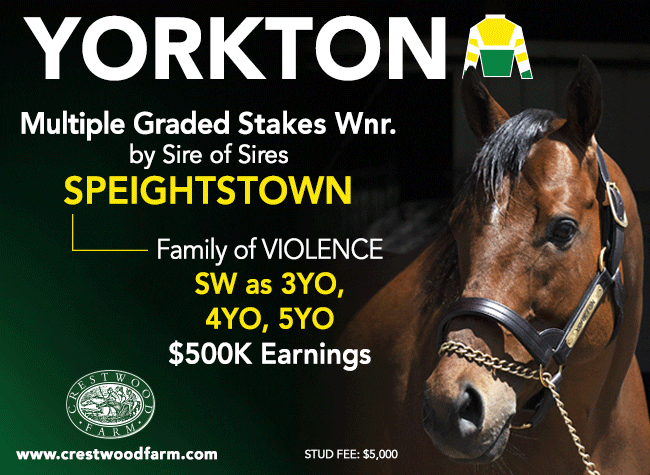Arthur “Bull” Hancock, Jr. and William Woodward, Sr. have been elected to the National Museum of Racing's Hall of Fame as 2016 Pillars of the Turf inductees.
The Pillars of the Turf category was introduced in 2013 to “honor individuals who have made extraordinary contributions to Thoroughbred racing in a leadership or pioneering capacity at the highest national level.” Candidates are considered for their integrity and commitment through ownership, breeding, innovation, philanthropy, promotion of the sport and education.
Hancock and Woodward join previous Pillars of the Turf selections August Belmont II (2013), Paul Mellon (2013), E.R. Bradley (2014), E.P. Taylor (2014), Alfred Vanderbilt II (2015) and John Hay Whitney (2015) in the Hall of Fame. They will be inducted in Saratoga on Friday, Aug. 12 along with racehorses Rachel Alexandra, Tom Ochiltree and Zenyatta; jockeys Ramon Dominguez and Wayne Wright; and trainer Steve Asmussen.
Arthur “Bull” Hancock, Jr. (1910-1972) grew up on Claiborne Farm and, after graduating from Princeton University in 1933 and serving in the Army Air Corps from 1941-45, took over the famed Kentucky nursery in the late 1940s when his father took ill.
Under Hancock Jr.'s guidance, Claiborne expanded from 2,100 acres to about 6,000 to become one of the most important Thoroughbred farms in the world. For 15 straight years (1955-1969), America's leading stallion was a Claiborne resident. Again in 1972, the year Hancock passed away at age 62, Claiborne's Round Table was the nation's leading sire. Top stallions to stand at the Paris, Ky farm during Hancock's era included Nasrullah, Princequillo and Bold Ruler. Hancock also acquired for stud important influences Nijinsky II, Ambiorix, Damascus, Sir Ivor, Tom Rolfe and Forli.
Claiborne also bred at least one champion in ever year from 1952 through 1972, and in five of those years produced as many as four divisional leaders. Claiborne also bred four European champions during Hancock's time, including important influence Nureyev. An incredible six champions of 1957–Nadir, Bold Ruler, Bayou, Dedicate, Round Table and Neji–were all foaled at Claiborne. Hancock campaigned homebred champions Moccasin, Nadir, Doubledogdare and Bayou. Hancock bred a total of 112 stakes winners under the Claiborne banner, and Claiborne was the nation's top breeder by earnings in 1958, 1959, 1968 and 1969.
Thirty-two champions were foaled at Claiborne for outside clients, including Hall of Famers Kelso, Buckpasser, Nashua, Bold Ruler, Round Table, Riva Ridge and Cicada.
Hancock bred a total of 112 stakes winners under the Claiborne banner, and also served as an advisor or partner to the likes of the Phipps family, William Haggin Perry, and fellow Pillar of the Turf selection William Woodward, Sr.
Hancock was the first “working horseman” to be elected to The Jockey Club. He was president of the American Thoroughbred Breeders Association and vice president of the American Thoroughbred Owners Association, and was instrumental in the merging of those two groups into the present day Thoroughbred Owners and Breeders Association (TOBA). He was a Keeneland director and trustee, and a director of Churchill Downs–he was one of 12 who purchased a controlling interest in the latter to avoid a conglomerate takeover. Hancock was also a member of the Kentucky Horse Racing Commission, a director of the Grayson Foundation, and a director of the Thoroughbred Breeders of Kentucky, where he helped establish the American Horse Council.
William Woodward, Sr. (1876-1953), a New York City native, was a graduate of Harvard Law School and was admitted to the bar in 1901, but never pursued a law career. He served as secretary to U.S. Ambassador to England Joseph Choate, and later became president of Hanover National Bank in 1910 after his uncle James T. Woodward died. Woodward also inherited Maryland's Belair Mansion and Stud from his uncle.
In 1925, Woodward partnered with Claiborne's Arthur Hancock, Sr. , R. A. Fairbairn and Marshall Field to purchase Sir Gallahad III for $125,000. The French import topped the American sire list in 1930, 1933, 1934 and 1940 and produced 60 stakes winner–nine of which were bred by Woodward. Among those stakes winners was 1930 Triple Crown winner Gallant Fox, who in turn produced 1935 Triple Crown winner Omaha for Woodward. Woodward won another three Belmonts–in 1932 with Fiareno, 1936 with Granville and 1939 with Johnstown. Four of his five Belmont winners–aside from Johnstown, who was purchased privately from Arthur Hancock, Jr.–was a homebred. All but Faireno were inducted into the Hall of Fame.
Woodward bred 101 stakes winners overall, including seven champions (Gallant Fox, Faireno, Happy Gal, Omaha, Granville, Vagrancy and Nashua). He also bred four European champions, and was second-leading owner in England in 1937.
Woodward also served as chairman of The Jockey Club from 1930 to 1950, and helped to establish the Coaching Club American Oaks and aided in the development of the Grayson Foundation. Woodward used his prominence in England to convince the sport's leaders in that country to repeal in Jersey Act, which had kept many American horse out of the General Stud Book. An honorary member of the British Jockey Club, he owned a vast collection of sporting art, which was donated to the Baltimore Museum of Art.
Woodward died in 1953 at the age off 77, one year after he bred Nashua. Racing for his son William Woodward, Jr., Nashua won a trio of stakes as a juvenile in 1954, including the Futurity and Hopeful. As a sophomore, he took the Preakness, Belmont, Florida Derby, Arlington Classic, Wood Memorial, Dwyer, Jockey Club Gold Cup and a famed match race against Swaps. He was named Horse of the Year, and later elected to the Hall of Fame.
The Pillars of the Turf are selected by a group of racing industry experts and historians under the guidance of chairman D. G. Van Clief.
Not a subscriber? Click here to sign up for the daily PDF or alerts.






